Hello FACNM members!
This week we wanted to highlight and provide resources for one important group within our Fire Adapted New Mexico Learning Network: Wildland firefighters & fire professionals. These individuals are essential to protecting our forests and communities and they face both physical and mental risks associated with their jobs. We’re grateful for all fire professionals and are sharing resources we hope can support them both on and off the job. [Warning: this post references suicide].
This week’s Wildfire Wednesday includes:
Background information on fire professionals for those who may be less familiar with the field.
Information on physical health for fire professionals.
Mental health resources for fire professionals.
A link to a success story involving firefighters in the Medio fire.
Have a great week everyone!
Liz
An Introduction to Fire Professionals
For those of us who may be unfamiliar with the many different types of fire professionals and what their jobs entail, The Forest Service’s People Working in Fire webpage provides good background information and great informative videos that can give you insight into the jobs and lives of firefighters.
Physical Health
Photo credit: Chris Tuite
The recent tragic death of Tim Hart, a smokejumper responding to a fire in New Mexico, demonstrates the inherent risk that fire professionals face on a daily basis. Firefighters additionally face increased rates of lung cancer, cardiovascular disease, hearing loss, and other smoke-related illnesses - but there are steps that one can take to reduce risk. The National Institute for Occupational Safety and Health (NIOSH) is currently working on a research project to deepen our understanding of the relationship between firefighters and cancer rates, click here to read more about this research.
Here is some advice from the Leukemia & Lymphoma Society Firefighters and Cancer Risk webpage on how to reduce your risk of fire-related cancer (visit this page for more details on how to carry out these steps):
Photo Credit: Miami-Dade Fire Rescue
Protect yourself at work.
Reduce exposure to diesel exhaust from the fire apparatus.
Clean and care for PPE and SCBA properly.
Wash yourself as soon as possible after every fire.
Store PPE gear correctly to avoid contaminating other areas in the firehouse or apparatus.
Always be cautious at the fire ground.
Talk to your doctor. As a firefighter, make sure your doctor knows your work or volunteer history, even if you are retired.
Discuss your risk of cancer with your doctor. Firefighters may need to start screening at an earlier age and do screenings more frequently than the general population. Ask about ways to reduce your risk of cancer, such as good nutrition, physical activity, and avoiding tobacco and alcohol.
The Fire Service Joint Labor Management Wellness-Fitness Initiative provides cancer screening recommendations for firefighters.
NFPA 1582: Comprehensive Occupational Medical Program for Fire Departments also provides health information for firefighters.
Record your exposure. The International Association of Firefighters (IAFF) recommends that firefighters keep a personal record that tracks exposures and incident responses.
Follow healthy lifestyle behaviors. Good nutrition, physical activity, and avoiding tobacco and alcohol can decrease your risk of cancer and other diseases. For more information about healthy lifestyle recommendations, download or order the free fact sheet Healthy Behaviors.
Mental Health
In the recent Workforce Resilience Ignite Talk Series “Wildland Firefighters Mental Health and Well-being” (video included below), fire professionals discussed the mental health risks associated with the job and the difficulty of “fitting in” when off-assignment. It was particularly inspiring to hear from Mark Titus, a fire professional who shared his journey of recovery from PTSD after his initial reluctance to seek help. It is not uncommon for firefighters to struggle with PTSD, substance abuse, suicidal thoughts or difficulties in relationships but there are resources available to help address and manage these challenges.
Click on the programs below for mental health resources specifically for fire professionals:
If you or someone you know is struggling with a mental health crisis call the National Suicide Prevention Hotline (available 24 hours in English & Spanish)
1-800-273-8255
2020 Medio Fire Success Story
Read the Medio Fire Factsheet and explore the Great Santa Fe Fireshed Coalition website to learn about how previous treatments and fire professionals successfully managed the 2020 Medio Fire to protect homes and vital resources in our community.



